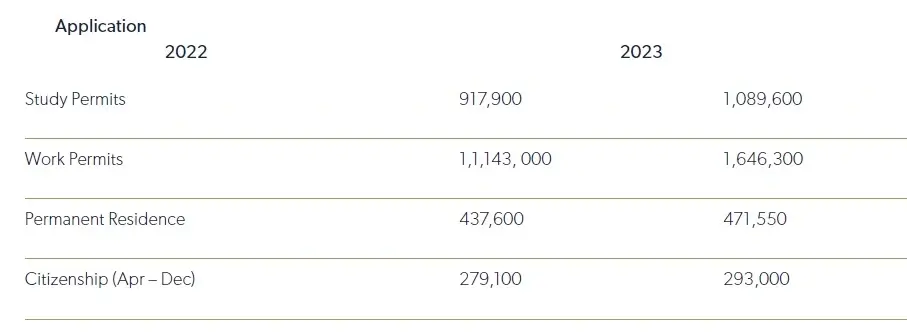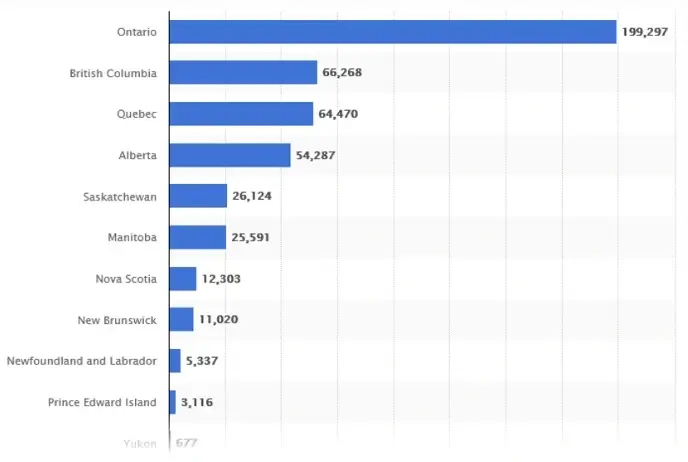
The immigration update scene has been relatively calm this week, but we have a few noteworthy updates to share along with a spotlight on one of our own client success stories.
Among the updates are the recent IRCC performance report, programs that do not require a high school diploma for PR applications, clarification on study permits, pilot program renewals and extensions, and the ongoing construction boom across Canada with the introduction of new PNP pilots. Additionally, we’ll also outline the top and bottom three PNPs in Canada for business entrepreneurs and professionals. Even during a “quiet” week, changes are always happening, and we’re here to ensure you stay informed.
Are you interested in obtaining PR status in Canada? At SINKA, we’re here to assist you! Receive a FREE email assessment with one of our licensed immigration consultants. We are proficient in over +8 languages and have aided applicants from over +50 countries in their journey to Canada. Simply fill out our form by clicking here.
IRCC 2023 Performance Report
According to the Canadian government website, the number of finalized applications increased across several fronts:

The influx of immigrants to Canada in 2023 demonstrates steady growth in every province, with Ontario taking a significant lead, as depicted in the graph below:

Are you interested in obtaining PR status in Canada? At SINKA, we’re here to assist you every step of the way! Receive a complimentary email assessment with one of our licensed immigration consultants. We are proficient in over +8 languages and have aided applicants from over +50 countries in their journey to Canada. Simply complete our form by clicking here.
Latest Immigration News: Study Permit Updates in Canada
Some recent changes have been made regarding who requires a Provincial Attestation Letter (PAL) for a study permit in Canada. If you fall into any of the following categories, you do not need this documentation:
You are applying to study in a preschool, primary school, or secondary school (up to grade 12).
You are applying to study in a master’s degree or doctoral degree program.
You have entered Canada and meet one of the following criteria:
Applying for a study permit extension.
Holding a work permit.
A temporary resident who is a visiting or exchange student at a designated learning institution (DLI).
A temporary resident who has completed a prerequisite course or program of study for enrollment at a DLI.
Under a removal order but unable to be removed from Canada at this time.
Holding a temporary resident permit valid for at least 6 months.
You are a family member of a foreign national living in Canada who meets additional criteria.
If you’re considering studying in Canada, you’ve come to the right place! At SINKA, we have successfully assisted applicants from over +50 countries. Obtain a FREE email assessment with one of our licensed immigration consultants by clicking here.
New Visa Application Center (VAC) in Lisbon
Today, the IRCC announced the inauguration of a fresh Canada Visa Application Centre (VAC) in Lisbon, Portugal, scheduled for February 26, 2024. This addition expands IRCC’s VAC network to encompass 163 locations across 110 countries globally.
Agri-Food Pilot Program – Latest Immigration News
Starting from February 10th, the IRCC will now recognize work experience obtained under an open work permit for vulnerable foreign workers as part of the work experience requirement, for applicants within Canada. This adjustment implies that individuals lacking a high school diploma can technically pursue permanent residency under the Pilot program, provided they meet the eligibility criteria for farm and food processing applicants. This Pilot program stands out as one of the few programs in Canada offering such an opportunity.
Applicants now have two avenues to apply under the Agri-Food Pilot Program:
A: Applicants without a job offer from an eligible farm or food processing plant must possess the minimum required work experience and education (a high school diploma), along with achieving a language exam score of CLB 4.
B: Applicants with a job offer from an eligible farm or food processing plant may apply even if they lack education (i.e., no high school diploma), provided they have a minimum of 1 year of full-time work experience in an eligible industry. Additionally, they must achieve a language exam score of CLB 4.
Latest Immigration News: Rural and Northern Immigration Pilot
The timeline for the Rural and Northern Immigration Pilot (RNIP) has now been prolonged until July 2024. It is anticipated that this program will transition to a permanent status within this year, possibly with some minor modifications, including the incorporation of Francophone streams.
Nova Scotia Immigration Update - Nova Scotia's Reaction to the Construction Surge
We are all aware of the housing crisis in Canada, leading to a surge in construction activities across many regions of the country. Last year, British Columbia’s Provincial Nominee Program (PNP) introduced a construction occupation stream, enabling construction workers and tradespeople to apply for permanent residency (PR) through their PNP.
Now, Nova Scotia has followed suit by introducing its own initiative, the “Critical Construction Worker Pilot” program, as part of its PNP stream. The program’s website provides a comprehensive list of occupations covered under this new pilot in Nova Scotia. It offers a direct pathway to PR for eligible applicants, whether they are located overseas or within Canada.
Here are some highlights of this new program:
No points-based assessment system.
No application fee for the PNP process; fees are only required upon nomination, before paying the PR fee to IRCC (Federal stage).
High school education is not mandatory if applicants have specialized training for their occupation.
The program includes a wide range of construction roles, from low-skilled jobs like construction laborers and material handlers to higher-skilled trades positions. Unlike other provinces that focus solely on trades, Nova Scotia encompasses both skill levels.
Lower language proficiency requirements, such as CLB 4 for low-skilled labor jobs in construction and CLB 5 for higher-skilled trades in construction.
As long as applicants meet the eligibility criteria, they are eligible to apply. This unique combination sets Nova Scotia’s program apart, making it a highly attractive option for prospective immigrants.
If you aspire to become a Permanent Resident in Canada, our team of licensed consultants can evaluate your profile against over 75 immigration programs across the country. Take the first step by filling out our form to receive a FREE email assessment.
IRCC Program Delivery Update
Previously, IRCC officers reviewing entrepreneur work permit applications would scrutinize PNP candidates under the Entrepreneur streams who were seeking work permits to establish their businesses. They would assess whether the applicants could bring significant benefits to Canada or the province. However, IRCC has recently revised these instructions, and officers will no longer apply the same level of scrutiny as before. For a more detailed explanation of this update, refer to Steven Meuurens’ analysis provided here.
Top 3 Worst and Best PR Programs
Our top three preferred PR programs for low-skilled applicants include:
The IRCC Caregiver Pilot Program
The Agri-Food Pilot Program
The Nova Scotia Provincial Pilot for Construction Workers
As of February 2024, here are the best and worst PNP programs based on our experience:
Worst:
Ontario
Quebec
British Columbia
Best:
Nova Scotia (no points system, no fees, no ITAs, considered the top choice)
Alberta (launching a unique hospitality and tourism stream, distinct from other provinces)
Saskatchewan (allows work experience as a student, no English requirements for entrepreneurs, and gives weight to family ties for direct PR).
For more detailed explanations on these rankings, refer to our previous posts.
ICT Canada Success Story
Finally, we have an update that hits close to home as one of our clients has recently been granted an ICT approval.
We obtained an Intra-Company Transfer, LMIA exempt code 61 approval within just 9 calendar days (equivalent to 6 business days). This speedy process took place at the embassy in New Delhi.
Why was our client’s ICT approved so swiftly? The answer is straightforward: our client’s ICT application was genuine. We ensured they visited Canada, engaged with key stakeholders in the industry, and had sufficient funds to invest and deposit in Canada. We meticulously outlined the significant benefits for the country based on key government data and documentation – leaving no room for vagueness or omissions.
Among the myriad of ICT applications received by the embassy, it was evident that the high-quality ones stood out.
Additionally, we obtained a closed work permit approval for a high-priority occupation for another client within 2 weeks, approved by the embassy in Abu Dhabi (known as one of the most challenging Canadian embassies overseas). Once again, the key lies in submitting top-notch applications with candidates well-suited for the selected program.
If you’re considering immigrating to Canada through the ICT program and seeking guidance and support, you’ve come to the right place! We are licensed and have successfully assisted applicants from over 50 nationalities. Get a FREE email assessment by clicking here.
Get a free email assessment
If you’re considering immigration, whether it’s permanent or temporary, you’ve come to the right place! Our team is proficient in over +9 languages, and we assist applicants from more than 50 different countries throughout their immigration journey. Click here for a FREE email assessment.
If you’re prepared to apply and would appreciate a one-on-one session with me or one of our immigration team members at SINKA, you can also schedule a session directly using this consultation link.
